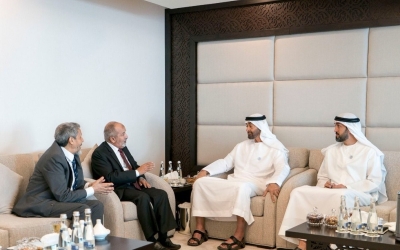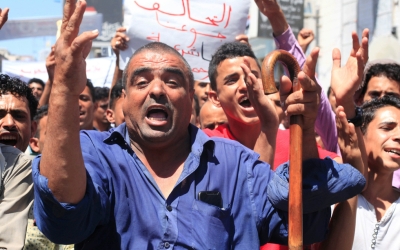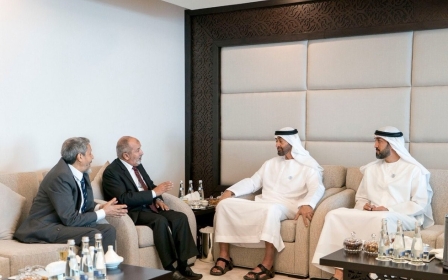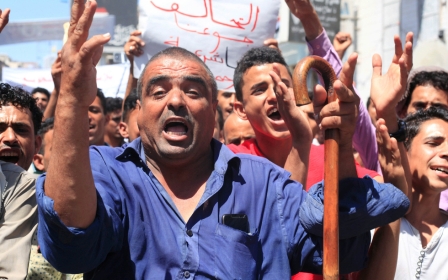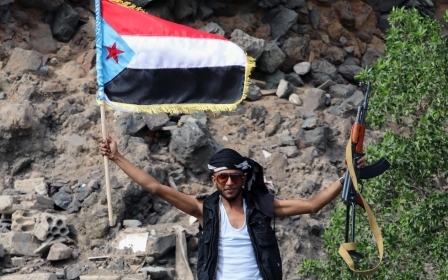Islah rally in support of UAE in Yemen's Taiz met with shock and scepticism
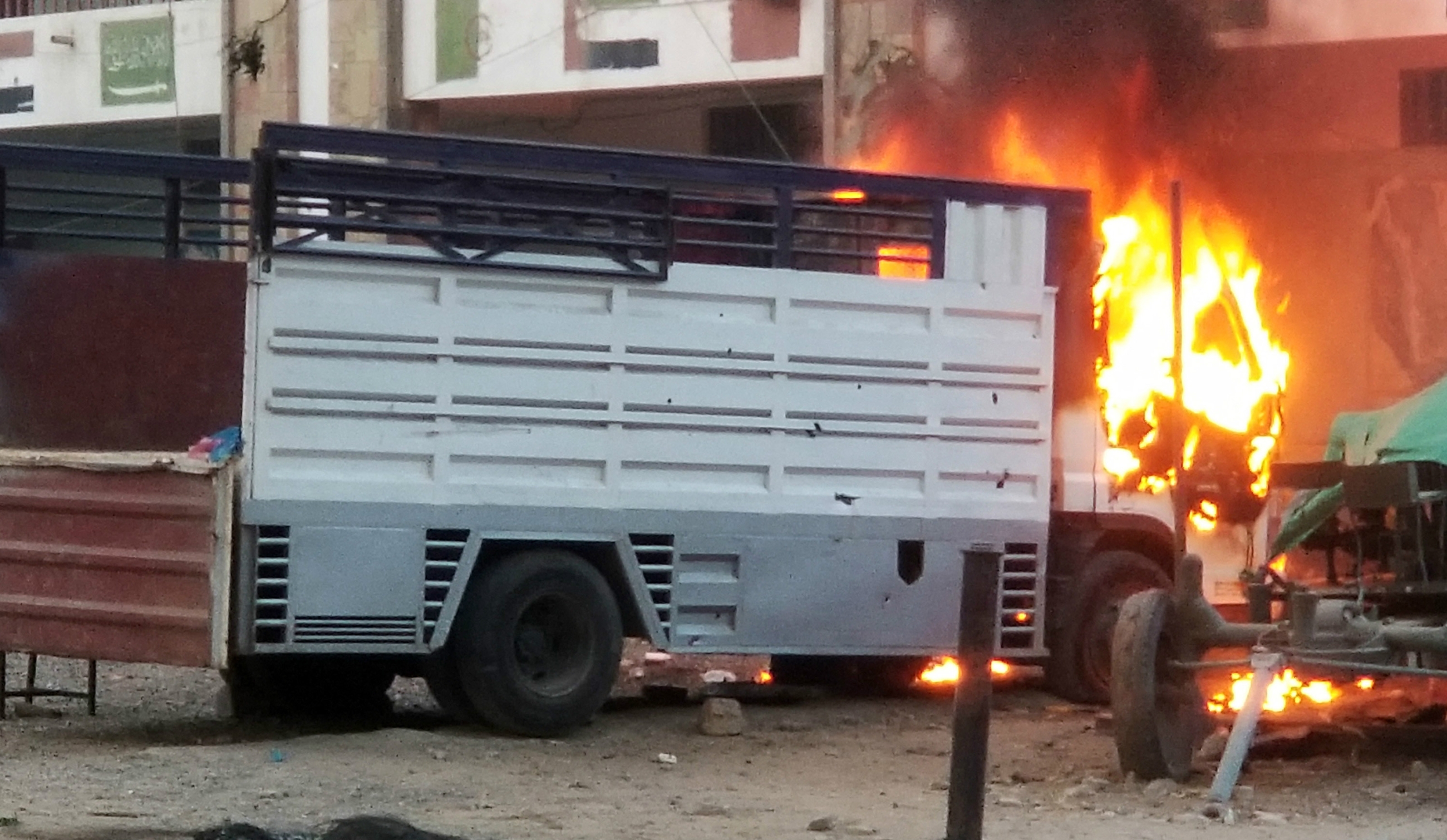
Just days after fierce clashes in Yemen's Taiz city between UAE-backed Salafi fighters and Islah fighters that left dozens dead and injured, the Muslim Brotherhood-linked Islah party organised a march on Saturday in the same city to thank the UAE for its support in Yemen.
The rally has been met with scepticism in many quarters, with Islah having spent years battling UAE-backed forces.
Both men and women participated in the march, in which photos of UAE and Saudi leaders were raised in an event aimed at thanking the Saudi-led coalition for its support on the fourth anniversary of Yemen's war.
'I am shocked to see marches of Taiz and the photos and slogans they raised'
- Fathi Bin Lazraq, editor-in-chief, Al-Ghad newspaper
Munther Ali, an Islah party member who participated in the march, said that people had come from different areas of the Taiz governate to send their message of thanks to the Saudi-led coalition and the whole world.
"It is true that there have been misunderstandings between Islah and some UAE-backed forces, but that does not mean we deny the role of the UAE and all coalition countries in fighting the Houthis," he told Middle East Eye.
New MEE newsletter: Jerusalem Dispatch
Sign up to get the latest insights and analysis on Israel-Palestine, alongside Turkey Unpacked and other MEE newsletters
"The enemies of Yemen claimed the misunderstanding to be a deep dispute between Islah and the UAE and this is not true at all as both Islah and the UAE are fighting the Houthis shoulder to shoulder."
Deep distrust
The relationship between Islah and the UAE is, in fact, an extremely complicated one.
Over the past four years, since the beginning of Yemen's war, the two sides have had a common aim in fighting the Iran-aligned Houthi rebels.
However, their relationship has been fraught to say the least and accompanied by deep distrust.
Over the last two years, battles have broken out in several Yemeni provinces between Islah fighters and UAE-backed forces.
Islah's political wing is seen as the Yemeni branch of the Muslim Brotherhood, a movement that the UAE and Saudi Arabia consider a terrorist group.
In September, Anwar Gargash, the Emirati Minister of State for Foreign Affairs, accused Islah of being behind a media campaign critical of the leaders of the Saudi-led coalition fighting the Houthis, including the UAE.
Gargash tweeted: "The shameful behaviour towards prominent figures of the Emirates and the coalition in Hadhramout, and some southern areas, by Islah will not discourage us to do our task.
"We are convinced that they are a minority that does not want Yemen to be better, while the coalition is doing its best to ensure stability and such behaviour will not shake the coalition."
Targeted assassinations
In October, it was revealed that in operations that began in 2015, the UAE had hired American and Israeli mercenaries to assassinate high-ranking members of the Islah party.
Unsurprsingly, the reports caused serious tensions within Islah on how to deal with the UAE's presence in Yemen.
In November, in a move that took many people by surprise, UAE Crown Prince Mohammed bin Zayed met with senior leaders of Islah in what was portrayed as a rapprochement between the two sides.
For the UAE, the move was seen as a bid to reduce risks to its commercial enterprise projects in the south of Yemen.
Islah was seen to have accepted the invitation for talks out of fatigue with the war and being overwhelmed by the superiority of the UAE-backed forces in the south.
Disputed disputes
Witnesses said last month's fighting between the Abu al-Abbas Brigades, one of the UAE-backed Salafi forces, and the Islah fighters was the bloodiest Taiz has endured in recent months.
The fighting, which reportedly began when Islah fighters backed by pro-government forces launched a military campaign targeting the Salafi forces on 21 March, also appeared to cast doubt on any rapprochement between Islah and the UAE.
Despite the UAE's continued patronage of local Salafi fighters such as Abu al-Abbas and the Amalqa Brigades, Islah party member Ali continued to defend Saturday's march in support of the UAE.
'The UAE did not believe this play by Islah'
- Mohammed Ali, veteran journalist
A few days before Saturday's march, small marches were organised by independent people and some minor political parties in Taiz, demanding security forces save the city from "outlaw groups", a term the city's local authorities use to describe the Salafi fighters.
Ali said that those marches were against the Islah party, as the protesters had accused Islah in an indirect way of being part of the chaos in the city as the fighting targeted Salafis in Taiz city.
"The battles in the city were between security forces and outlaw fighters [Salafis] and the security forces were not fighting the Salafis because they receive support from UAE, but because they are an outlaw armed group.
"In all conditions, we sent a message to the whole world that the UAE is our main partner and no one can talk about disputes between UAE and Islah after this march."
Saleem Sultan, another Islah party member who participated in the march, told MEE that Islah is getting larger every day and its popularity shows that it is an organised party.
"Islah has the largest popularity and such an organised party does not want to lose a single member, so definitely this party does not want to lose its relationship with any country," he said.
"Islah is trying its best to build new relations around the world, so all what said about deep disputes between Islah and the UAE cannot be true."
Islah no longer unified
Mohammed Ali, a veteran journalist based in Taiz, suggested that the march took place becauses Islah is witnessing internal contradictions in its policymaking as its leaders are no longer as unified as they were before the war started.
"They [Islah] are fighting UAE-backed forces in the south and in Taiz, and suddenly they take to the streets to thank the UAE," he told MEE.
"Islah is divided nowadays and while there are some members who criticise the UAE, there are some others who want to gain the support of the UAE."
He said that a wing inside the Islah party feels that they can no longer combat the UAE in Yemen so they decided to take to the streets to thank the UAE, but he believes that the UAE is not stupid enough to believe Islah.
"We heard UAE officials criticise Islah, but after the march of Islah in Taiz we did not hear Gargash or any another UAE leader thank Islah, this is an indication that the UAE did not believe this play by Islah."
Islah's 'hypocrisy is unbelievable'
Meanwhile, there has been anger on social media against Islah's new policy from commentators in Yemen.
Ali al-Bukhaiti, a Yemeni political analyst, tweeted: "The Muslim Brotherhood's [Islah party] hypocrisy is unbelievable, and the ability of their followers to go along with their leaders' hypocrisy is even more unbelievable.
"What religion do they follow that allows them this degree of hypocrisy and delusion? I am shocked to see marches of Taiz and the photos and slogans they raised."
Fathi bin Lazraq, the editor-in-chief of Aden's Al-Ghad newspaper, wrote on Facebook: "The large crowds that Islah gathers in Taiz every two months are from strong youths, so why doesn't the party recruit them to liberate Taiz from the Houthis instead of involving them in secondary battles including protests.
"Islah does not learn from past lessons. In 2011, Islah thought it could rule Yemen alone but it lost the whole of Yemen."
Bin Lazraq said that Islah does not need to be involved in battles such as those against the Salafi forces within Taiz city and it is not a good for just Islah to rule the city alone.
The big battle should be the liberation of the Taiz governate from the rebels, he told MEE.
"The success of the battles against the Houthis is the only thing that will make Islah victorious, otherwise Islah will remain the party which destroys the country by protests."
Middle East Eye delivers independent and unrivalled coverage and analysis of the Middle East, North Africa and beyond. To learn more about republishing this content and the associated fees, please fill out this form. More about MEE can be found here.


